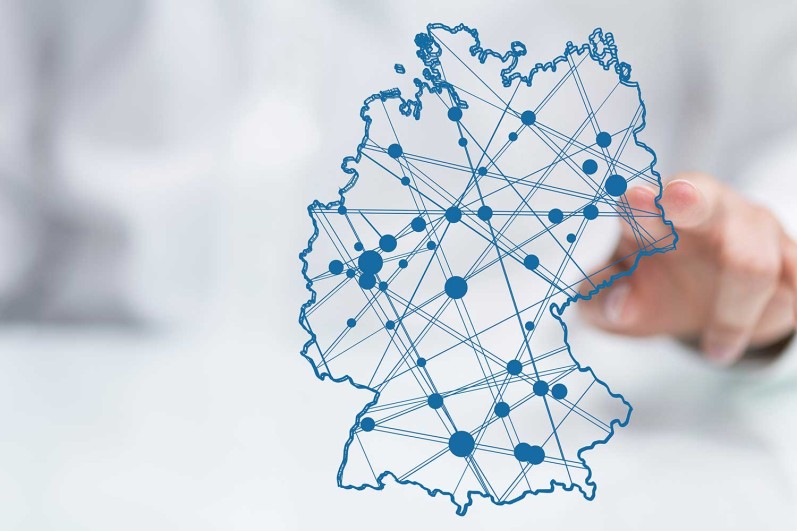Page content
Patronage of SCCON 2025
Source: Sebastian Woithe
The Federal Ministry for Digitalisation and State Modernisation - a new, strong partner of the Smart Country Convention
Driving digitalisation, reducing bureaucracy, simplifying administration - with the new Federal Ministry for Digitalisation and State Modernisation (BMDS), Germany has a ministry dedicated to these goals.
Whether it is child benefit without an application, online administrative procedures instead of waiting in the office or setting up a business in 24 hours - the BMDS wants to ensure that digital solutions become part of everyday life. Behind the ministry is Karsten Wildberger, Germany's first Federal Minister of Digitalisation, who not only has big ambitions but also wants to get down to work: "The BMDS is a driving force for concrete, visible progress in digitalisation and a modern, efficient administration."
We are delighted that Karsten Wildberger and his Ministry has taken over the patronage for the Smart Country Convention 2025 from the Federal Ministry of the Interior.
After all, the leading event for the digitalisation of the puclic sector is about exactly what drives the new Ministry: modern administration, digital infrastructure and smart solutions for countries, cities and regions.
Germany's first Minister of Digitalisation: Karsten Wildberger
The topics of the BMDS
- Digital government - Germany becomes more digital, faster and more efficient
- Modernising the state - reducing bureaucracy, easing structural burdens
- Digital economy - promoting innovation, digitising the private sector
- Digital sovereignty - European cooperation and investment
- Digital infrastructure - prerequisite for a future-oriented state
- International digital policy - Actively shaping collaboration
Digital government - Germany becomes more digital, faster and more efficient

The Federal Ministry for Digitalisation and State Modernisation wants to provide administrative services completely digital, fast and without unnecessary applications. The basis for this is the "Deutschland-Stack" - a common digital infrastructure for the federal, state and local governments. Digital identities, a central citizen account and automated processes will make administrative procedures largely redundant. Artificial intelligence and cloud services will ensure greater efficiency and user-friendliness. Digital sovereignty remains central: the BMDS relies on trustworthy European technologies.
Modernising the state - reducing bureaucracy, easing structural burdens

The BMDS aims to streamline the public administration, digitalise processes and noticeably reduce the burden on citizens and the private sector. A key objective is to establish reliable and practice-oriented regulatory frameworks while implementing the "once only" principle across the board. Outdated regulations, duplicate structures and superfluous reporting obligations are to be abolished and central tasks bundled. Artificial intelligence, agile methods and flexible working models will strengthen a modern administrative culture. This year, an immediate programme to cut red tape will provide concrete relief, especially for small and medium-sized enterprises
Digital economy - promoting innovation, digitising the private sector

To ensure that Germany is internationally competitive, the Federal Ministry for Digitalisation and State Modernisation is promoting an innovation-friendly environment, especially for the use of artificial intelligence and the data economy. This includes clear regulations, secure test fields and a centralised AI supervision to support companies and research institutions. With open data obligations, data trusts and modern data protection approaches, the BMDS aims to simplify access to data while guaranteeing responsibility. Meanwhile, the state has to set a good example in the use of new technologies and expand digital processes in the administration. The aim is to use digital technologies to promote growth, new jobs and social progress.
Digital sovereignty - European cooperation and investment

The Federal Ministry for Digitalisation and State Modernisation is strategically reorienting digital policy to reduce technological dependencies and improve the safety of key infrastructures. The focus is on the targeted development of technological innovations made in Europe - such as AI, cloud, semiconductors,cybersecurity solutions - and the promotion of trustworthy, interoperable systems. Therefore, the state has to create incentives for the digital economy and enable the exclusion of providers that do not meet the local security standards. Digital independence can only be achieved in close cooperation with European partners, for example through joint projects and open standards. Economy and society are equally called upon to actively shape and use sovereign technologies.
Digital infrastructure - prerequisite for a future-oriented state

A comprehensive, high-performing digital infrastructure plays a key role for economic growth, social participation and the state's ability to act. With new legal regulations, simplified approval procedures and digital application processes, the BMDS is creating better conditions for the expansion of fibre-optic networks and 5G. The focus is on private investment - supplemented by targeted funding in underserved regions. Reliable mobile communication services will be made available everywhere: Coverage requirements will be tightened and more closely monitored from a user perspective. The aim is to create a modern infrastructure that benefits digital transformation sustainably.
International digital policy - Actively shaping collaboration

Germany plays a major role in international digital policy and aims to help shaping digital change on the basis of European values. The Federal Ministry for Digitalisation and Government Modernisation represents Germany at EU level and in global bodies such as the G7, G20 and the United Nations. It is committed to the business-friendly and innovation-promoting implementation of EU regulations such as the AI Regulation and the Data Protection Act. The BMDS promotes a free, secure and open digitalisation through a multi-stakeholder approach and the protection of democratic values. It also develops strategic partnerships, especially with countries in the Global South, to strengthen digital sovereignty and open markets.




